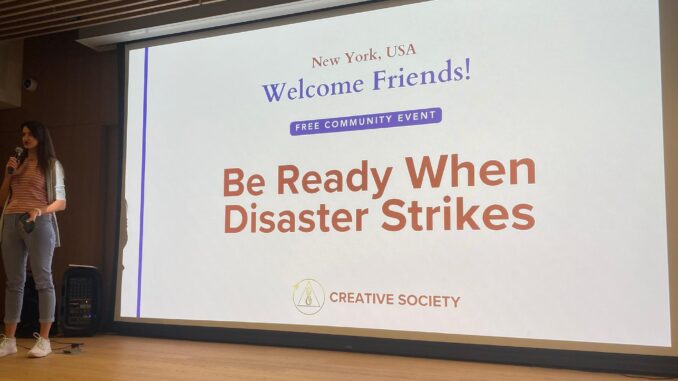
BY CAITLYN JONSSON
Videos of flooding, landslides, hurricanes, and tornados played on a projector as attendees trickled into a dimly lit conference room at the Brooklyn Heights Library on October 19th. As the room slowly filled, dramatic music played steadily at a low volume and volunteers for the Creative Society told attendees to help themselves to an array of fruits, chocolates, and beverages.
What was promised at the event? Education on climate change paired with practical methods for preparing for climate disasters. What was delivered? Two hours of speculation by the organizers on the cause and impacts of climate change in ways that are not supported by generally accepted scientific data.
The Creative Society describes themselves as an international project that unites people from over 180 countries. They say they are composed entirely of volunteers with knowledge from 28 years of independent research. Rather than highlighting human behavior and the use of fossil fuels as the primary contributor to climate change and its impacts, three volunteers used Saturday afternoon to argue that microplastics and a shift in the Earth’s core are major contributors to the increase in natural disasters throughout the globe, a theory that contradicts most scientific evidence.
A call center representative for the main branch of the Brooklyn Public Library said that there is no background research or vetting process for the programs hosted at the library. Organizations apply to host a program online or fill out an application in person, and if the application seems in line with the library’s values it will be accepted. The Brooklyn Heights branch has been temporarily closed for construction and has not responded to the inquiry for comment at the time of publication.
Evelina Cherif, a member of the Creative Society, captured the attention of attendees with claims about plastic pollution and ocean heating, suggesting that the ocean is heating the atmosphere rather than vice versa. “The real threat is in a different place… it’s not just air pollution” Cherif said, discussing what she described as the growing influence of microplastics in the ocean. “The ocean has a lot of plastic which traps the heat inside of it… the ocean can no longer cool the planet.”
According to the National Oceanic and Atmospheric Administration, the primary cause of ocean warming is the greenhouse effect, where carbon dioxide and other greenhouse gasses trap heat in the Earth’s atmosphere, which is then absorbed by the oceans. NOAA’s data shows that 90% of the warming caused by human-induced climate change is absorbed by the oceans, primarily due to increased carbon emissions, not plastics.
Though plastic pollution in oceans is a well-documented environmental concern, the argument that plastics are a significant driver of ocean heating conflicts with widely accepted scientific research. Microplastics primarily affect marine life and ecosystems, disrupting food chains and contributing to ocean pollution but they do not generate the kind of heat necessary to alter ocean temperatures on a global scale.
Presenters also speculated on the potential for a series of natural disasters, such as supervolcano eruptions, which the Creative Society claims will be triggered by a shift in the Earth’s core. The organization warned attendees of these threats, stating that supervolcanoes “are waking up,” and arguing that one may erupt within the next 7 years, triggering others throughout the world with the potential to wipe out regions.
While volcanic eruptions can cause widespread damage, the suggestion that supervolcanoes are currently in a state of awakening lacks support from volcanologists. The United States Geological Survey monitors supervolcanoes like Yellowstone closely and reports no signs of imminent large-scale eruptions. The last supervolcanic eruption occurred over 27,000 years ago in New Zealand, and while these eruptions can have catastrophic consequences, they are rare.
The presenters offered brief practical advice on the importance of purchasing emergency survival kits and recommended downloading the Notify NYC app, an app designed to notify residents of potential climate emergencies. The audience was encouraged to think about community survival strategies, with the suggestion that groups of people have a higher chance of surviving a catastrophe than individuals.
